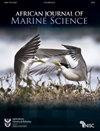When cooling is worse than warming: investigations into the thermal tolerance of an endemic reef fish, Boopsoidea inornata
IF 1.4
4区 生物学
Q3 MARINE & FRESHWATER BIOLOGY
引用次数: 1
Abstract
Recent investigations suggest that global warming is likely to alter temperature regimes along the southeastern coastline of South Africa through the increased frequency of upwelling events. Identifying thermal thresholds is fundamental in predicting the response of marine ectotherms to rapidly changing ocean temperatures. The aim of this study was to determine the thermal tolerance of the endemic sparid Boopsoidea inornata. To achieve this, 20 wild fish were captured from near Noordhoek in Gqeberha (Port Elizabeth). The fish were exposed to laboratory-simulated upwelling and heat-plume conditions until sublethal endpoints were identified to estimate the critical lower (CTmin) and critical upper (CTmax) thermal limits, respectively. During the simulated cooling or heating events, the opercular beat (OB) rates were recorded, their sublethal endpoints (loss of equilibrium) were identified, and their CTmin and CTmax were estimated. Breakpoint analyses of the OB rates identified the lower and upper thermal stress limits to occur at an average of 9 °C and 25 °C, respectively. The CTmin was estimated to be 7.8 °C and the CTmax 30 °C. When compared with in situ temperatures, these limits suggest that B. inornata is susceptible to small reductions in the minimum temperature. Given that the frequency and magnitude of upwelling events are expected to increase in response to global warming, this may have significant consequences for this and other sympatric, resident species.当冷却比变暖更糟糕时:对一种地方性珊瑚鱼的耐热性的调查
最近的调查表明,全球变暖可能会通过上升流事件的频率增加而改变南非东南海岸线的温度状况。识别热阈值是预测海洋外胚层对快速变化的海洋温度的反应的基础。本研究的目的是确定地方性斯巴达虫的耐热性。为此,在Gqeberha(伊丽莎白港)的诺德霍克附近捕获了20条野生鱼类。这些鱼暴露在实验室模拟的上升流和热羽流条件下,直到确定亚致死终点,分别估计临界下限(CTmin)和临界上限(CTmax)。在模拟的冷却或加热事件中,记录顶盖搏动(OB)率,确定其亚致死终点(平衡损失),并估计其CTmin和CTmax。OB速率的断点分析确定了平均温度分别为9°C和25°C时出现的热应力下限和上限。CTmin估计为7.8°C,CTmax估计为30°C。当与现场温度相比时,这些极限值表明,B.inornata容易受到最低温度小幅降低的影响。鉴于上升流事件的频率和规模预计将随着全球变暖而增加,这可能会对该物种和其他同域的常驻物种产生重大影响。
本文章由计算机程序翻译,如有差异,请以英文原文为准。
求助全文
约1分钟内获得全文
求助全文
来源期刊

African Journal of Marine Science
生物-海洋与淡水生物学
CiteScore
2.60
自引率
16.70%
发文量
17
审稿时长
6-12 weeks
期刊介绍:
The African (formerly South African) Journal of Marine Science provides an international forum for the publication of original scientific contributions or critical reviews, involving oceanic, shelf or estuarine waters, inclusive of oceanography, studies of organisms and their habitats, and aquaculture. Papers on the conservation and management of living resources, relevant social science and governance, or new techniques, are all welcomed, as are those that integrate different disciplines. Priority will be given to rigorous, question-driven research, rather than descriptive research. Contributions from African waters, including the Southern Ocean, are particularly encouraged, although not to the exclusion of those from elsewhere that have relevance to the African context. Submissions may take the form of a paper or a short communication. The journal aims to achieve a balanced representation of subject areas but also publishes proceedings of symposia in dedicated issues, as well as guest-edited suites on thematic topics in regular issues.
 求助内容:
求助内容: 应助结果提醒方式:
应助结果提醒方式:


